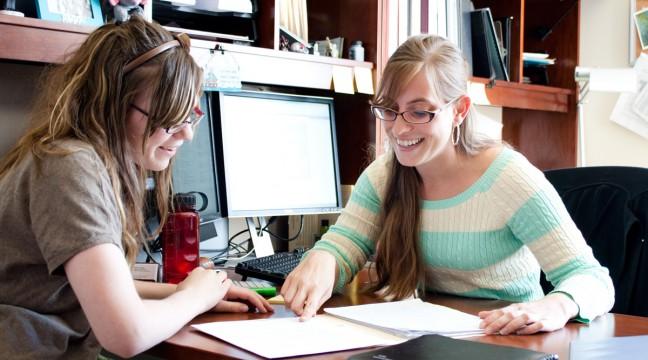Academic advisors and peer mentors are prepared to help students navigate the college landscape. But some students elect not to turn to these advisors and mentors for guidance.
As each incoming freshman grade moves onto campus and begins their time at the University of Wisconsin, they must face an entirely new set of challenges. At a school as large and complex as UW, it is easy to feel overwhelmed and fall behind. To ensure that this does not happen, UW assigns each student advisors who can answer almost any question.
One of the most essential tasks for advisors and peer mentors is to provide basic information for students and direct them through the myriad of resources provided by the university, such as University Health Services, academic advising and much more.
The amount of subcategories that fall under academic support alone demonstrates just how many options students have. To a set of untrained eyes, the immense support network of UW presents challenges.
UW Math Professor and Academic Advisor Robert Wiedenhoeft said the role that advisors play in a student’s life is more nuanced than most think.
“I want to help them make well informed decisions, I don’t want to tell them that they can or cannot do anything,” Wiedenhoeft said. “I want them to use me as a second pair of eyes on their academics or personal pursuits.”
UW sophomore and environmental studies major Nicolas Franchini said he has had positive experiences with his academic advisor. His meetings with advisors have been “immensely helpful,” not only guiding him how to navigate college and succeed, but also to broaden his understand of himself.
“My advisor plays an immense role in guiding me down the right academic path that works best for me,” Franchini said.
To Wiedenhoeft, advising is more than just telling students how to register for classes and where to find certain resources.
Advisors must read between the lines and have a fuller understanding of a student’s life to truly be able to help them succeed. Students might come to advisors and say they are struggling in their math class, looking for guidance on what their next steps should be.
“There are dozens of underlying reasons that a student could be struggling in math,” Wiedenhoeft said. “It’s my job to not just listen to the presenting issue but also what could be causing the issues behind the scenes.”
According to Wiedenhoeft, it is abundantly clear that advisors are more than just a source for surface level information about classes. They are prepared to drop everything in order to see a student flourish within a new environment.
So, if this is the case, then why are some students still not using their academic advisors?
In a survey designed and conducted by College Pulse, over 2,000 undergraduate students were asked questions regarding their relationship with college advisors and mentors. This survey found 44% of respondents said they did not have a mentor that helped them navigate college.
When asked why this might be, 53% of responses said they would not know how to find a mentor, and 25% said they would not know what to ask a mentor. There are several reasons why a student may not reach out to seek support from an advisor.
“It takes maturity to understand that reaching out for support does not mean that you are weak,” Wiedenhoeft said. “Not to say that there is anything wrong with students that are hesitant to reach out, but it is a process that many people go through to realize that reaching out and using the resources around you is a sign of strength.”
According to Savvy Students Get the Guidance, an article discussing the College Pulse survey, students may not be able to find a mentor due to differences in class, gender or race.
Ultimately, though not as statistically significant as somebody not knowing how to find an advisor, the presence of socioeconomic differences is still a factor for many students in choosing a mentor or advisor.
There is no definitive answer as to why a student may or may not find an advisor or mentor. Each student is unique, and therefore will have a unique set of circumstances. But according to Wiedenhoeft, the goal is to make them as comfortable as possible.
“There is some fear that they are meeting with an authority figure,” Wiedenhoeft said. “It is my responsibility to demonstrate that I am a non-judgmental, supportive listener.”


